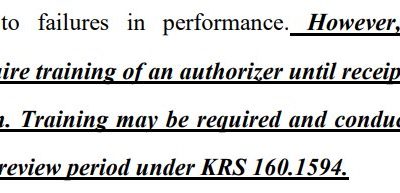This past Tuesday, Robert Stivers, of Kentucky’s 45th Senate District, introduced Senate Bill 10, which greatly restricts Governor Andy Beshear’s power to appoint the 11 members of the statewide Board of Education. It does this by invalidating Beshear’s current appointments and amending the existing law to require that the board reflect, as closely as possible, a proportional representation of Kentucky’s gender, ethnic (per the most recent census), and political composition.
In other words, if the bill passes as it’s currently written, Beshear must appoint to the 11-member board five men and six women, or vice-versa; of these, nine would need to be Caucasians, one an African-American, and one an “other,” who ideally would have one Asian parent, one Hispanic parent, and perhaps a Native American grandparent; of these, exactly six would have to be registered Republicans, and five Democrats—unless a member belongs to neither party, in which case five Republicans and five Democrats. Or if two belong to neither party, five Republicans and four Democrats. Or if….
You get the drift. And what a miserable, ill-considered piece of legislation it is, both in intent and execution. Putting aside the logistical difficulty of actually assembling a board adhering to those precise requirements—one can imagine a harried staffer, a stack of C.V.s on her desk, shouting across a busy office: “I need a Republican Latina to make this work, people!”—it’s a bill designed to do nothing more than to ensure the KBE remains about 89% white and 55% Republican, in line with the current demographic composition of the state. That’s it. That’s what it does.
Of course Stivers is really just trying to stick it to Beshear, who summarily dismissed the Matt Bevin-appointed board the day he took office and replaced the lot of them with nothing but Democrats, an action that undermines Beshear’s claim that he’s “trying to change the tone in Frankfort.” After all, taking an executive action that Beshear knew very well would aggravate the Republican-controlled legislature is more or less the same tone we’ve had in Frankfort for years, isn’t it?
To be clear, Beshear was within his authority to appoint an entirely new KBE, but he did so in a manner that transparently served as a rebuke to his predecessor Bevin and a shot across the bow of the state GOP. I mean, come on: not one Republican? Not even the illusion of balance?
And now Stivers has responded with a bill that seems impractical at best and borderline segregationist at worst: to wit, if, hypothetically, two or three board candidates of superior qualifications happened to be black Democrats they could be legally blocked from confirmation, as Stivers would have it . Or, following the logic, what if our harried staffer above located not one but three or four Republican Latinas of eminent qualifications? To which demographic characteristic does Stivers give precedence? Gender, politics, or ethnicity?
It sounds absurd, and it is. The bill reads as affirmative action gone terribly, frighteningly wrong, as it excludes any consideration of a candidate’s merit in favor of a meaningless system of quotas. Perhaps, however, the bill does help explain the GOP’s historical opposition to affirmative action by revealing that they simply don’t understand how it’s actually supposed to work.
As the Herald Leader reported on Wednesday, KY120, the educator/activist organization behind the teacher sick-outs and marches of the last couple of years, called the bill, in a Facebook post, “petty.” And it is petty. But is it any pettier than Beshear’s wholesale replacement of the previous board? If he truly wants reconciliation and bi-partisan cooperation…well, never mind. It’s safer to assume that he doesn’t.
If you’re keeping score, it’s possible Stivers did gain a slight advantage over Beshear by removing from KRS 156.029 (the bill S.B. 10 would amend) the language that requires nominees to the KBE to be confirmed by both the House and the Senate. The new law would assign confirmation to the Senate only. Why? Likely because Senate Republicans currently wield a massive 76% super-majority (29 of 38) over their Democratic colleagues, while the House GOP holds but 62 of the 100 seats. And in 2020, all 100 of those House seats are up for grabs, compared to only half of the Senate’s 38. Even in the most tumultuous election cycle, the Senate will almost certainly retain a substantial majority after November’s election, while the House may not. One assumes that Stivers means to remove that particular variable from the KBE equation.
Is any of this good for the education of the Commonwealth’s children? Does this round of political tête-à-tête serve our state’s best interests? I’m sure both Beshear and Stivers will continue to claim the high ground. And they’ll both be wrong.





Leave a Reply